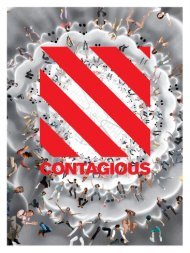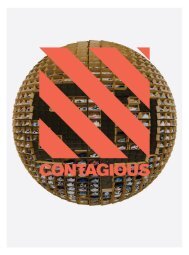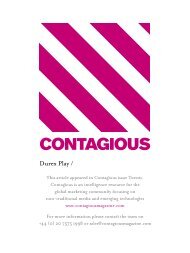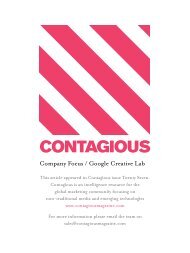MostContagious2012.pdf - Contagious Magazine
MostContagious2012.pdf - Contagious Magazine
MostContagious2012.pdf - Contagious Magazine
You also want an ePaper? Increase the reach of your titles
YUMPU automatically turns print PDFs into web optimized ePapers that Google loves.
sbpf / little<br />
brands, big<br />
thinkers<br />
Who Gives A Crap /<br />
One of the most remarkable projects arising from<br />
crowdfunding platform Indiegogo this year is Who<br />
Gives A Crap, a subscription-based toilet paper brand<br />
making a direct attempt to solve sanitation issues by<br />
donating 50% of its profits to help build waste facilities<br />
in the developing world. The company was first<br />
established in late 2010 by social entrepreneur Simon<br />
Griffiths, former Method designer Daniel Alexander<br />
and strategist Jehan Ratnatunga.<br />
Who Gives A Crap has successfully proven that a<br />
commodity product like toilet paper does not need to<br />
be dull and fluffy, or without a grander sense of purpose.<br />
The company raised AU$66,548 (US$69,000)<br />
in just 50 hours in July 2012, partially thanks to Griffiths<br />
staging a ‘sit in’, live-streaming himself on the<br />
toilet until the company hit its funding goal.<br />
The organisation is currently taking pre-orders from<br />
Australia and the US. <strong>Contagious</strong> 33.<br />
whogivesacrap.org<br />
Percolate /<br />
How often have you been annoyed by bland and<br />
generic posts on a brand’s social media pages along<br />
the lines of ‘Like this funny cat video if you also like<br />
cats’? Branded content has been one of the most<br />
hotly discussed topics in ad land this year. Percolate, a<br />
New York startup founded by former Barbarian Group<br />
strategy director Noah Brier and former VP of publishing<br />
at Federated Media James Gross, has developed<br />
smart algorithms to help blue chip clients source<br />
brand-relevant content, from interesting studies to<br />
sector-specific news.<br />
This then enables brands to use this content as the<br />
basis for their messages across social media, helping<br />
them navigate the potentially tricky waters in a more<br />
relevant and meaningful way. Percolate received<br />
$1.5m in funding late last year and secured another<br />
$9m, in November. We’re looking forward to seeing<br />
what Percolate will get up to next, given that 90% of<br />
respondents to a content marketing survey by Econsultancy<br />
(October 2012) said that branded content<br />
will become increasingly important over the next 12<br />
months. <strong>Contagious</strong> 33.<br />
percolate.com<br />
Dollar Shave Club /<br />
Dollar Shave Club burst onto the subscription services<br />
scene with a standout convenience service that<br />
skilfully does away with the hassle and cost of buying<br />
razors. Its witty launch video featuring charismatic cofounder<br />
and improv comic Michael Dubin clocked up<br />
more than seven million views while challenging the<br />
big players in the male grooming market (‘Do you like<br />
spending $20 a month on brand-name razors? Nineteen<br />
go to Roger Federer.’).<br />
After receiving initial funding of $1.1m in March this<br />
year, Dollar Shave Club secured an additional $9.8m<br />
in November. Given the monthly subscription options<br />
at $1, $6 or $9, this is a great vote of confidence for<br />
the company and its founders Dubin and Mark Levine.<br />
<strong>Contagious</strong> 33.<br />
www.dollarshaveclub.com<br />
Raspberry Pi /<br />
Raspberry Pi was cited as a ‘one to watch’ in the<br />
technology section of 2011’s Most <strong>Contagious</strong> report<br />
before its release. Since going on general sale in<br />
February, the credit-card sized computer has been<br />
stocked by major high street electronics retailers and<br />
is expected to sell more than one million units by February<br />
2013. Founder Eben Upton’s Cambridge-based<br />
organisation aimed to address a decline in uptake of<br />
computer science classes in schools by developing<br />
a programmable mini computer that could easily be<br />
wiped and rebooted.<br />
Since its launch the device has featured in hack days<br />
from Scotland to SXSW, rebooting maker culture.<br />
Raspberry Pi has been approached by hospitals and<br />
museums; developing countries are hoping to benefit<br />
from the device thanks to its low cost (between $25-<br />
35) and ease of use. The registered charity reports that<br />
some universities are providing their freshmen with a<br />
Raspberry Pi whilst even seven-year-olds are using it<br />
to program games themselves.<br />
www.raspberrypi.org<br />
MOVEMENTs purpose sErVicE data technology design social biz sharing amplified screens augmented retail personalise new loyalty payment sbpf<br />
58










